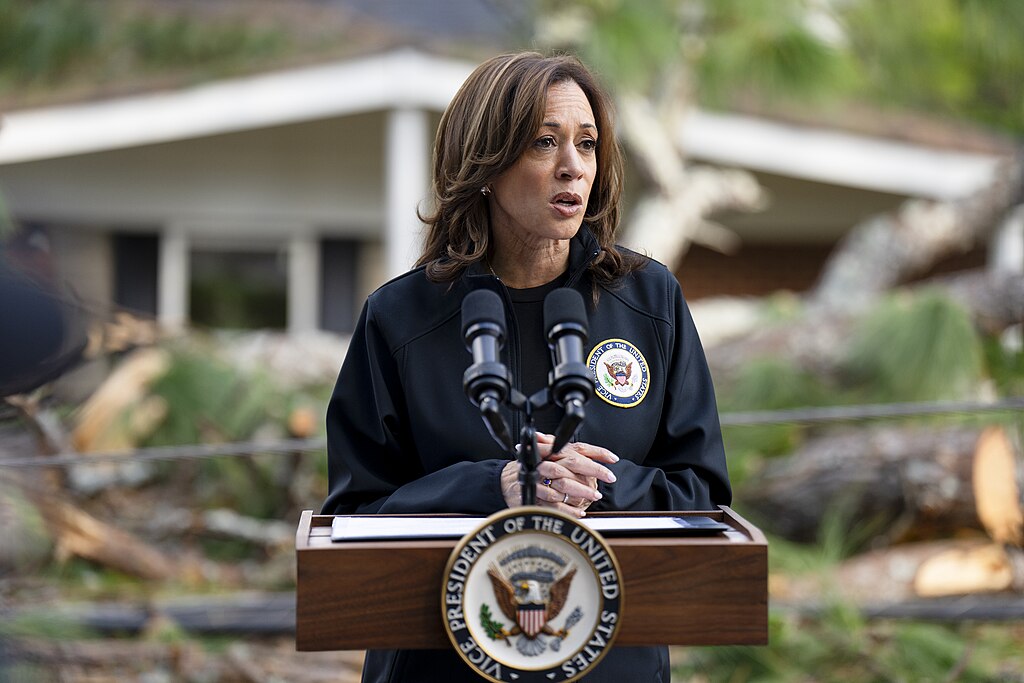Vice President Kamala Harris faced a wave of criticism and online mockery today after a video surfaced showing her holding a phone during what appeared to be a staged call with a voter. Sharp-eyed observers noted that the camera app was visibly open on the screen, leading to accusations that the Vice President was “faking” the call for the cameras. The footage quickly went viral, with critics labeling the incident as an embarrassing misstep and pointing to it as further evidence of a disconnect between the administration and the public.
The video, initially posted on social media, shows Harris seated with a smartphone in her hand, seemingly engaged in conversation. However, a closer look reveals the camera interface on the screen rather than an active call, sparking immediate reactions across social platforms. “She’s pretending to be on a call with a voter, but it’s the camera app,” one user wrote. “It’s just more staged political theater.”
For Harris’s detractors, this incident has added fuel to ongoing criticisms about the administration’s handling of public relations. Some have gone as far as to call it a deliberate attempt to fabricate connections with voters, while others suggested it might have simply been a blunder. “If this is how they think they can connect with Americans, it’s disappointing,” tweeted one observer. Others took a more humorous approach, with memes and comments poking fun at the Vice President’s “pretend call.”
Political analyst Karen Lyons argues that while the incident might seem trivial, it highlights a larger issue regarding public perception. “For a public figure like the Vice President, every action is scrutinized. Moments like these, whether intentional or accidental, can detract from the administration’s message,” Lyons said. “The perception of authenticity is key, and incidents like this can make voters feel like they’re being treated to political theater rather than genuine outreach.”
The Vice President’s office has yet to release a comment addressing the video, and it remains unclear whether the apparent “phone gaffe” was a simple oversight or a planned moment gone wrong. White House staff, however, have privately indicated that such moments are often misinterpreted or overblown online, where social media users are quick to jump on details that might otherwise be overlooked.
Meanwhile, Harris supporters have rushed to her defense, arguing that such critiques distract from real issues and are part of a pattern of unfair scrutiny directed at the Vice President. “It’s ridiculous how the smallest thing gets blown out of proportion,” said a supporter on Twitter. “Focus on her policies, not petty distractions.”
The viral incident has sparked debates about the importance of authenticity in political outreach and the high level of scrutiny public officials face. Whether an honest mistake or a poorly executed photo op, the “fake call” has given Harris’s critics new material and created a stir in an election season already charged with tensions. For many, the event underscores the challenges of performing political outreach in the digital age, where even minor mishaps can be amplified online.



 EU Urges Maximum Restraint in Iran Conflict Amid Fears of Regional Escalation and Oil Supply Disruption
EU Urges Maximum Restraint in Iran Conflict Amid Fears of Regional Escalation and Oil Supply Disruption  Iran Detains U.S. Citizens Amid Escalating Conflict With the United States and Israel
Iran Detains U.S. Citizens Amid Escalating Conflict With the United States and Israel  Australia Rules Out Military Involvement in Iran Conflict as Middle East Tensions Escalate
Australia Rules Out Military Involvement in Iran Conflict as Middle East Tensions Escalate  Trump Warns Iran as Gulf Conflict Disrupts Oil Markets and Global Trade
Trump Warns Iran as Gulf Conflict Disrupts Oil Markets and Global Trade  Russia Signals Openness to U.S. Security Guarantees for Ukraine at Geneva Peace Talks
Russia Signals Openness to U.S. Security Guarantees for Ukraine at Geneva Peace Talks  Failure of US-Iran talks was all-too predictable – but Trump could still have stuck with diplomacy over strikes
Failure of US-Iran talks was all-too predictable – but Trump could still have stuck with diplomacy over strikes  Israel Strikes Hezbollah Targets in Lebanon After Missile and Drone Attacks
Israel Strikes Hezbollah Targets in Lebanon After Missile and Drone Attacks  Trump Says U.S. Attacks on Iran Will Continue, Warns of More American Casualties
Trump Says U.S. Attacks on Iran Will Continue, Warns of More American Casualties  U.S.-Israel War on Iran Escalates as Gulf Conflict Disrupts Oil, Air Travel and Regional Security
U.S.-Israel War on Iran Escalates as Gulf Conflict Disrupts Oil, Air Travel and Regional Security  U.S.-Israel Strike on Iran Escalates Middle East Conflict, Trump Claims Khamenei Killed
U.S.-Israel Strike on Iran Escalates Middle East Conflict, Trump Claims Khamenei Killed  Why did Iran bomb Dubai? A Middle East expert explains the regional alliances at play
Why did Iran bomb Dubai? A Middle East expert explains the regional alliances at play  Trump to Attend White House Correspondents’ Dinner 2026, Ending Long Boycott
Trump to Attend White House Correspondents’ Dinner 2026, Ending Long Boycott  Trump Says U.S. Combat Operations in Iran Will Continue Until Objectives Are Met
Trump Says U.S. Combat Operations in Iran Will Continue Until Objectives Are Met  Middle East Conflict Escalates After Khamenei’s Death as U.S., Israel and Iran Exchange Strikes
Middle East Conflict Escalates After Khamenei’s Death as U.S., Israel and Iran Exchange Strikes  U.S. Deploys Tomahawks, B-2 Bombers, F-35 Jets and AI Tools in Operation Epic Fury Against Iran
U.S. Deploys Tomahawks, B-2 Bombers, F-35 Jets and AI Tools in Operation Epic Fury Against Iran  Supreme Court Backs GOP Lawmaker in New York Redistricting Fight Ahead of Midterms
Supreme Court Backs GOP Lawmaker in New York Redistricting Fight Ahead of Midterms  Suspected Drone Strike Hits RAF Akrotiri Base in Cyprus, Causing Limited Damage
Suspected Drone Strike Hits RAF Akrotiri Base in Cyprus, Causing Limited Damage 































